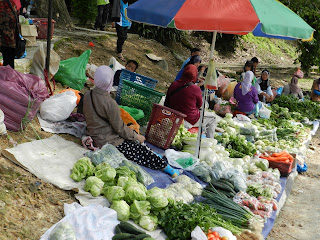 |
| The High Priestess of Sabah |
This week I had a meeting with the new head of the Education Department in Ranau who happens to be a woman. I was waiting in the waiting area watching all the Headmasters and Education officers coming out of a meeting with her - all in their best suits trying to impress this new boss and marvelling at the equality of the sexes in Malaysia. Despite the reservations I have about certain aspects of Malaysian life there is one thing that really impresses me which is the positive role of women. I was surprised when a friend from UK asked me whether I found it difficult seeing the Muslim women in a subservient role to men and I could honestly say that for the majority of women that I know, they are not in any way subservient - in fact the opposite. I think traditionally it is a matriarchal society with women in charge of the family. Certainly for the Dusun people it is the women who have the spiritual powers and the bobozians ( high priestesses) are the most respected members of the village and in charge of the spiritual well being of the village. Despite Christianity and Islam being introduced and there being fewer bobozians, I think that women have still have held their position of authority in society. Two of my Muslim friends happen to be the strongest, fiestiest women I have ever met. One of them runs a women's group around Ranau and travels all over Asia attending conferences on women's rights, the other one is a headmistress and no one including her husband would dare to disagree with her!! There is of course the Muslim "protocol" of "asking" their husband for permission but the answer nearly always works in their favour! Sometimes it surprises me when a teacher tells me that she must ask her husband permission to learn to play the guitar but in my experience I see no subservient females around Ranau!!
 |
| Bobozians chanting |
As the third week of Ramadhan approaches and the third Ramadhan for me, I feel more used to the rhythm. The family are up early to eat before 4.30 am and by 1 pm everyone is beginning to lag. They usually have a rest or sleep in the afternoon and then everyone starts preparing the food ready for the "berbuka puasa" at 6.30 pm. The evening market in Ranau is buzzing with activity while everyone buys lots of food in readiness for the breaking fast. Not only do they fast during Ramadhan but they are expected to pray more times. Instead of five times a day the minimum expected is 8 times and for the very good people 20 times is the goal. The firecrackers are going off and the delicious biscuits and cakes are beginning to be sold in preparation for Hari Raya. My dear friend Heidi arrives on Thursday evening and I'm hoping to celebrate Hari Raya with her and some friends in Ranau.




























